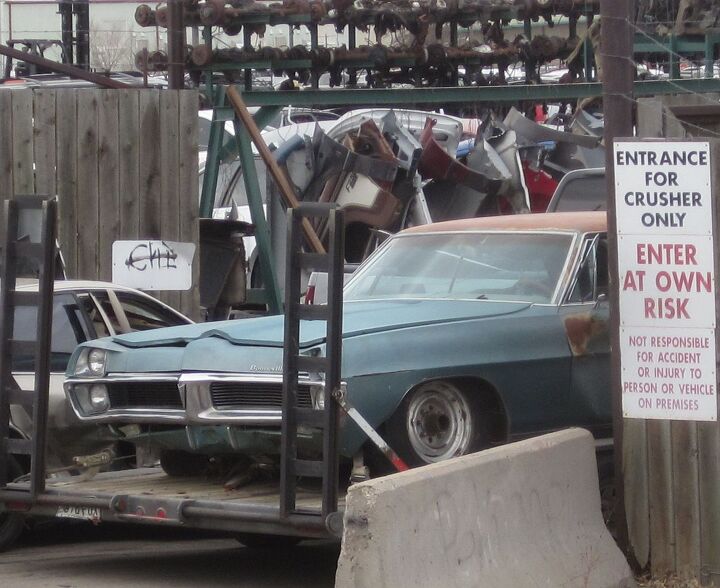End Of The Line: Welcome To The Crusher!

Scrap-steel prices have been climbing like crazy in recent months, with the scrap price for junk cars reaching about $250/ton here in Colorado. That means that a lot of potential project cars that have spent decades in back yards and driveways, waiting to get back on the road, are now worth an easy 400 bucks at The Crusher. Armies of steel-crazed scavengers with car trailers and flatbed trucks have been scouring the countryside for unwanted— or, more accurately, insufficiently wanted— vehicles to turn into quick cash. I hit a local metal-recycling yard yesterday to see the frenzy for myself.
Back when I lived in the San Francisco Bay Area, I often commuted across the Bay on a ferry that docked across the Oakland Estuary from the Schnitzer Steel yard at the Port of Oakland. I knew the mountains of rusty steel were once cars that Schnitzer had on the yard at its chain of self-service wrecking yards (Schnitzer Steel owns the Pick-N-Pull chain), but it was impossible to recognize anything in those China-bound mountains of ex-car steel.
Things are more up close and personal when you visit The Crusher in person; here’s a fairly solid and complete Corvair that’s probably a cube of metal in a container in a train car, bound for the nearest container-ship port (Oakland, most likely), by the time you read this. Kind of a shame, but nobody was willing to buy it and fix it.
I was there with a friend who was disposing of the carcass of a wrecked Suburban he’d bought as a drivetrain donor for a project truck. Nobody’s going to shed any tears over the loss of a wrecked late-model Suburban, right? I know I won’t!
However, even my cold, cold heart felt a pang when I saw this rough-but-repairable Mercedes-Benz W126 coupe on the end of a chain, headed to certain death. How? Why? $250/ton, that’s why!
I couldn’t tell which SEC this was, but it’s a big German coupe with a V8, and— by the time you read this— it has been chewed up like so many Saturn SL2s and broken washing machines.
Another Malaise Era Ford bites the dust.
How about a Dodge Diplomat? Remember when all the cops drove these?
This BMW 7 Series has depreciated about as far as it’s possible to go.
Poor 4-door Bonneville. Nobody loves big 1960s sedans… until they put them on the scale and realize that they’re worth $500 in quick cash.
Late Fox Mustang GT with V8 and 5-speed? Crushed.
Woodgrain Late Malaise station wagon? Crushed.
The whole process happens fairly quickly. First you wait in a line of doomed cars on trailers and old pickups with beds full of brake drums and steel pipe.
The seller flashes the vehicle’s title, and a big forklift picks it up.
A guy with a pickaxe punches a couple of holes in the car’s gas tank and drains the gas into a series of 5-gallon buckets.
The flammable-liquid action never stops at this place!
Some of the gas seemed pretty fresh, and some of it had that bad-old-gas smell and dark color.
Apparently it was once possible to get drained gas from Crusher victims for free. These days, no dice.
This goes on all day, every day, all over the country. I was at this Crusher for about an hour and saw at least a half-dozen interesting cars get eaten. How many meet their demise every day? As long as China hungers for scrap steel, it will continue at this pace.

Murilee Martin is the pen name of Phil Greden, a writer who has lived in Minnesota, California, Georgia and (now) Colorado. He has toiled at copywriting, technical writing, junkmail writing, fiction writing and now automotive writing. He has owned many terrible vehicles and some good ones. He spends a great deal of time in self-service junkyards. These days, he writes for publications including Autoweek, Autoblog, Hagerty, The Truth About Cars and Capital One.
More by Murilee Martin
Latest Car Reviews
Read moreLatest Product Reviews
Read moreRecent Comments
- Honda1 Unions were needed back in the early days, not needed know. There are plenty of rules and regulations and government agencies that keep companies in line. It's just a money grad and nothing more. Fain is a punk!
- 1995 SC If the necessary number of employees vote to unionize then yes, they should be unionized. That's how it works.
- Sobhuza Trooper That Dave Thomas fella sounds like the kind of twit who is oh-so-quick to tell us how easy and fun the bus is for any and all of your personal transportation needs. The time to get to and from the bus stop is never a concern. The time waiting for the bus is never a concern. The time waiting for a connection (if there is one) is never a concern. The weather is never a concern. Whatever you might be carrying or intend to purchase is never a concern. Nope, Boo Cars! Yeah Buses! Buses rule!Needless to say, these twits don't actual take the damn bus.
- MaintenanceCosts Nobody here seems to acknowledge that there are multiple use cases for cars.Some people spend all their time driving all over the country and need every mile and minute of time savings. ICE cars are better for them right now.Some people only drive locally and fly when they travel. For them, there's probably a range number that works, and they don't really need more. For the uses for which we use our EV, that would be around 150 miles. The other thing about a low range requirement is it can make 120V charging viable. If you don't drive more than an average of about 40 miles/day, you can probably get enough electrons through a wall outlet. We spent over two years charging our Bolt only through 120V, while our house was getting rebuilt, and never had an issue.Those are extremes. There are all sorts of use cases in between, which probably represent the majority of drivers. For some users, what's needed is more range. But I think for most users, what's needed is better charging. Retrofit apartment garages like Tim's with 240V outlets at every spot. Install more L3 chargers in supermarket parking lots and alongside gas stations. Make chargers that work like Tesla Superchargers as ubiquitous as gas stations, and EV charging will not be an issue for most users.
- MaintenanceCosts I don't have an opinion on whether any one plant unionizing is the right answer, but the employees sure need to have the right to organize. Unions or the credible threat of unionization are the only thing, history has proven, that can keep employers honest. Without it, we've seen over and over, the employers have complete power over the workers and feel free to exploit the workers however they see fit. (And don't tell me "oh, the workers can just leave" - in an oligopolistic industry, working conditions quickly converge, and there's not another employer right around the corner.)



























































Comments
Join the conversation
Sad as it is to see (some of) these cars going to the crusher, this is an excellent example of Net Present Value (NPV) calculations "in action." In my college days, I was on first name basis with the guys at a local yard (the doberman liked me, too) where I scarfed up then-plentitudinous Vega parts. I remember stopping in toward the end of my Vega days for something or another, and being told that all the Vegas (and most of the Monzas) were being crushed and that I should grab what I wanted *that day*... My son and I are slowly restoring a '62 and '63 Beetle together, and most of the VW boneyards I've known over the years have dried up, too. They don't last forever...
12/15/2015 I just got linked to this old article . Sad to see the Corvair and others , I wonder if the Ford Pickup truck near the Corvair is one of those nifty unibody ones ? . I used to run a Junk Yard in the 1970's and most of my life has been spent sourcing parts from them an lamenting the greedy jerk who usually run them , jerks who'd rather crush @ .30 cents / pound then sell to you for $4 / pound as used parts.... I never had excess inventory , I got the cars in and broke them , sold off the parts as soon as anyone came in with ca$h . I made decent $ on the scrap too and that when it was (IIRC) 25 cents or so the pound . The truth remains : no one wants to pony up much $ for an old car and the parts sellers would rather gouge than meet you half way most of the time . -Nate